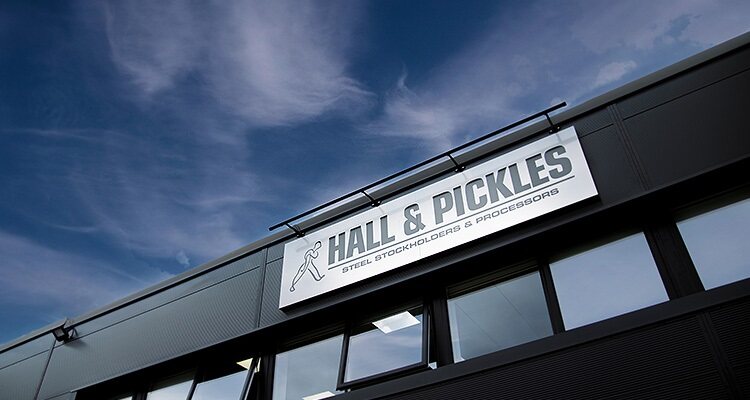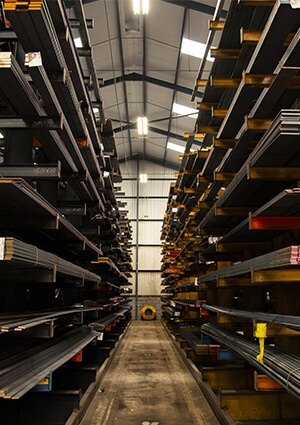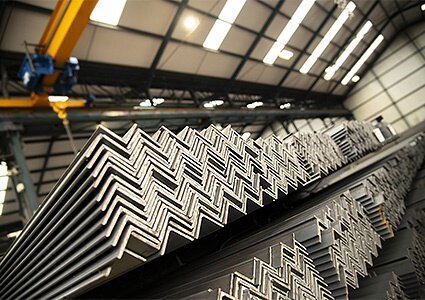
Steel Dynasty’s Evolution: Hall & Pickles’ Journey from 1812 to UK Market Leadership
The Hall family are proud of their long association with the steel industry, a history dating back to 1812. Through seven generations of the Hall family, Hall & Pickles, as it is now known, has evolved through consistent investment and innovation into the market leader it is today. From humble beginnings, back in 1812, Hall & Pickles is now one of the largest independent steel stockholders in the United Kingdom with an annual turnover of more than £200 million.
 In 1996, under the chairmanship of Richard Hall, John Tainton continued as a trading division of Hall & Pickles, reaffirming its relationship with the Hall family. From its 120,000 square-foot purpose-built headquarters on the Hoo Farm Industrial Estate in Kidderminster, the company continues to hold its high market position as the leading supplier of fully flattened steel sheets. Good customer relationships are paramount to the business, and customers continue to benefit from reliable service and quality products.
In 1996, under the chairmanship of Richard Hall, John Tainton continued as a trading division of Hall & Pickles, reaffirming its relationship with the Hall family. From its 120,000 square-foot purpose-built headquarters on the Hoo Farm Industrial Estate in Kidderminster, the company continues to hold its high market position as the leading supplier of fully flattened steel sheets. Good customer relationships are paramount to the business, and customers continue to benefit from reliable service and quality products.
“John Tainton is renowned in the industry for a very high level of service and high-quality products,” begins Matthew Hall, Managing Director. “Under the wider Hall & Pickles stockholding dynasty, we offer the full range of processing services, from shot blasting, painting, drilling, punching, and cutting to lasering, which is a relatively new service and differentiates us from a large amount of the competition. We offer a very high level of processing. While most steel stockholders offer cutting, we try and take it to the next level and fulfil any customer requirements, including contract business, which is generally bespoke.
“John Tainton specializes in flat steel and is proud to offer its QUICK STOCK service to meet the requirements of customers for same day and next day delivery. With state-of-the-art cut-to-length decoil line technology, the business supplies customers with mild and high strength steel flat rolled products produced to the highest quality standards.
“Hall & Pickles is multi-divisional with depots all over the country. Its tube laser cutting capabilities can be used for mild steel, stainless steel and aluminum products, including open profiles such as channels, angles, and hollow sections. Again, the lead time is very short. We can generally turn items around within about two days. The business also offers a comprehensive sawing service incorporating both square and mitre sawing of its full range of products. The latest range of high precision saws provides close tolerance sawing on short lead times to customers throughout the UK. The business is currently in very good shape. Rather than drawing profits, we’ve been pumping funds back in and investing, thereby leaving us in a strong position,” he explains.
The supply chain has experienced considerable disruption in recent years and Matthew highlights that the steel sector hasn’t been an exception to that rule. “We were able to continue operating during the pandemic as we were intrinsically involved in the manufacture of medical equipment components. The problem for us was getting hold of the raw materials. The price of steel actually went through the roof because there were shortages right across the globe, not just in the UK. During that time, we were simply trying to balance shortages with keeping our existing clients happy. Then just as the sector was beginning to normalize, the situation in Ukraine erupted. Ukraine was a prolific steel producer, and the effects were felt keenly around the world. Then recently, prices have completely collapsed for several reasons, which has killed demand. This cycle is beginning to come to an end, but demand has been down in the UK by around 20 percent. As such, we reacted to the situation by reducing our prices but ensuring our service level remains high. We have a high stock turnover to support cash flow and balance this with fulfilling customer requirements.”
 Alongside supply chain issues, an additional challenge is attracting labor to the industry. “We take on apprentices,” Matthew continues, “and offer them experience across the business. It’s incredibly difficult to find shop floor labor. We do outreach work with local schools to drive engagement and try to attract younger generations into the industry. As a family business, we stick to our core values and look after our employees at all levels. Most of my management team have been with me for 30 or so years and staff turnover is low. We train internally and are already involved in succession planning for the future of the business.”
Alongside supply chain issues, an additional challenge is attracting labor to the industry. “We take on apprentices,” Matthew continues, “and offer them experience across the business. It’s incredibly difficult to find shop floor labor. We do outreach work with local schools to drive engagement and try to attract younger generations into the industry. As a family business, we stick to our core values and look after our employees at all levels. Most of my management team have been with me for 30 or so years and staff turnover is low. We train internally and are already involved in succession planning for the future of the business.”
Matthew goes on to elaborate on the organization’s commitment to sustainability initiatives. “The trade, in general, is moving very quickly towards carbon neutral steel. From our perspective, we don’t buy from mills that we don’t trust and that don’t have a proven record of trying to improve what they’re doing from an environmentally responsible standpoint. All our steel is recyclable, so, any byproducts or scrap goes back to the steel mills to be melted down and repurposed. In terms of our facilities, we have reroofed and rewired our warehouses to be as energy efficient as possible. We’ve also implemented initiatives to enhance the energy efficiency of our office buildings. Company cars are either hybrid or electric and we’ve installed charging points around our sites. We’re also exploring more environmentally viable options for our steel haulage. Additionally, we’ve just signed up to install solar panels at our head office, which, if successful, will be rolled out to other sites and we’re looking into battery technology so that we can store the generated energy for use when we need it. We obviously report on our emissions too and while some initiatives won’t be completed imminently, we’ll be making great strides over the next few years.
“Looking to the future, we tend to approach growth conservatively and organically. If the right business comes up for acquisition, then we explore it as a possibility. We have no borrowing as a business and will invest as necessary. We’ve recently purchased a new site and are acquiring another that will enable us to double the size of our John Tainton business. We’re also hoping to get planning permission at Hall & Pickles for a purpose-built laser processing facility where we can install between four and six additional lasers. The construction and equipment will equate to a significant investment and is certainly a longer-term plan, over the next five-to-ten years. This development will dovetail with our sustainability initiatives, which will certainly keep us busy moving forwards,” Matthew concludes.